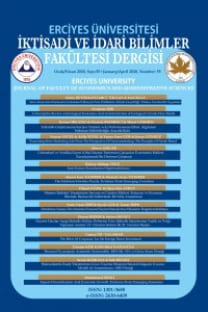Haftada Üç Gün Çalışan İş Görenleri ve Çoklu Vardiyaları Olan Organizasyonların Çizelgeleme Problemleri İçin Sıfır Bir Programlama Modeli
Hızlandırılmış çalışma haftası işgörenlerin haftada daha az sayıda gün ama günde daha uzun süre çalıştığı çalışma haftasıdır. Bu çalışmada, sıkıştırılmış çalışma haftalarını içeren işgücü çizelgeleme problemi ele alınmıştır. Hung’un (1993) çalışması esas alınarak işgörenlerin haftada üç gün ve çoklu vardiyalar şeklinde çalıştığı karar problemini çözmek için sıfır bir programlama modeli kurulmuştur. Bu model bir örnek problem üzerinde uygulanmış ve çözüm sonuçları yorumlanmıştır.
Zero-One Programming Model for Scheduling Problems of Organizations that Hae Labours Working Three Days a Week and Have Multiple Shifts
A compressed workweek is a workweek which workers work fewer days a week but a longer duration in a day. In this paper a workforce scheduling problem that includes compressed workweeks has been studied. A zero-one programming model has been set up to solve three days aweek and multiple shifts working scheduling problem which was based on Hung’s (1993) study. This model has been applied on a sample problem and the results of the solution has been evaluated.
___
- ALFARES, Hesham K. (2004); “Survey, Categorization, and Comparison of Recent Tour Scheduling Literature”, Annals of Operations Research,127 , ss.145-175.
- ALFARES, Hesham.K.; (2000), “Dual-Based Optimization Of Cyclic Three-Day Workweek Scheduling”, Asia-Pacific Journal of Operations Research, 17, ss.137-148.
- ALFARES, Hesham.K.; (2003), “Flexible 4-day Workweek Scheduling With Weekend Work Frequency Constraints”, Computer and Industrial Engineering, 44, , ss.325-338.
- BURNS, Richard.N.; Rangarajan NARASIMHAN ve L.Douglas. SMITH; (1998) “A Set Processing Algorithm For Scheduling Stuff on 4-Day or 3-Day Workweeks”, Naval Research Logistics, 45, ss.839-853.
- DANTZIG, George B.;(1954) “ A Comment On Edie’s Traffic Delays At Tool Booths” Operations Research, 2(3), June 21, ss. 339-341.
- HUNG, Rudy; (1993), “A Three-Day Workweek Multiple-Shift Scheduling Model”, Operational Research Society, 44(2), ss.141-146.
- HUNG, Rudy; (1994a), “Multiple-shift Workforce Scheduling Under 3-4 Workweek with Different Weekday and Weekend Labor Requirements”, Management Science, 40(2), ss.280-284.
- HUNG, Rudy; (1994b) “A Multiple-shift Workforce Scheduling Model Under the 4-Day Workweek with Weekday and Weekend Labor Demands”, Operational Research Society,.45(9), ss.1088-1092.
- NARASIMHAN, Rangarajan; (2000) “An Algorithm For Multiple Shift Scheduling Of Hierarchical Workforce On Four-Day Or Three-Day Workweeks”, Infor, 38(1), ss.14-32.
- SEÇKİNER ULUSAM, Serap; Hadi GÖKÇEN ve Mustafa KURT.; (2007) “An Integer Programming Model For Hierarchical Workforce Scheduling Problem”, European Journal of Operational Research, 183, ss. 694-699.
- ISSN: 1301-3688
- Yayın Aralığı: Yılda 3 Sayı
- Başlangıç: 1981
- Yayıncı: -
Sayıdaki Diğer Makaleler
Göreve İlişkin Çatışmalarda Etkileşimci ve Dönüşümcü Liderlik Üzerine Etiksel Bir Değerlendirme
Paydaş Teorisi ve İşletmelerin Paydaşları ile İlişkilerinin Yönetimi
Restoran Hizmetlerinde Müşteri Şikayet Davranışları: Sivas İli'nde Bir Uygulama
Hasta Memnuniyetinin Hasta Bağlılığı Üzerine Etkisi
Ramazan ERDEM, Levent AVCI, Bülent DEMİREL, Seda KÖSEOĞLU, Gülhan FIRAT, Tuğba KESİCİ, Şule KIRMIZIGÜL, Seda ÜZEL, Süheyla RAHMAN, Cemile KUBAT
